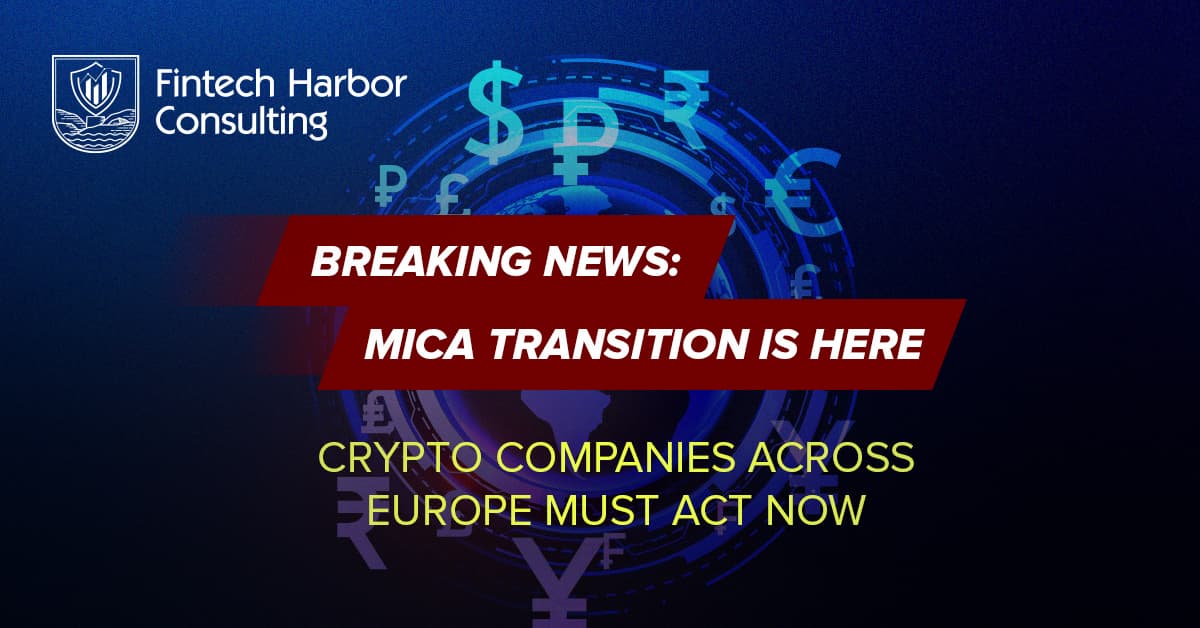
Do you hold a Virtual Asset Service Provider (VASP) license in Europe and believe you still have time before the new rules fully come into force? The truth is, if you still operate under the VASP license in the EU, you cannot afford to wait any longer. The major change entering the European landscape is the Markets in Crypto-Assets Regulation (MiCA), which requires all existing VASPs to transition to the Crypto-Asset Service Provider (CASP). This critical enforcement is approaching quickly, with the final deadline for the shift on July 1, 2026.
What about existing and emerging crypto businesses within the EU? For them to thrive through the great changes, operators need to secure their next move right now. Waiting for the clock to tick the deadline is a dangerous game, as obtaining the CASP licensing requires thorough preparation and planning ahead. Read further to learn about the three strategic paths for current VASP holders and what the new MiCA rules signify for your project’s future.
Early and Late Movers in the EU

As of today, the patchwork of MiCA’s implementation across the European Union has a critical compliance gap. Overall, there are two distinctive ways in which various countries in the region have been adapting to the new regulation. On the one hand, there are pioneering member states, such as the Czech Republic, Malta, and Bulgaria, that have been remarkably proactive and are already establishing clear transitional laws to handle the shift from national VASP registration to the Crypto-Asset Service Provider (CASP) licensing under MiCA. Such clarity enables these nations’ local crypto companies to initiate the complex preparation process with an effective roadmap for each subsequent step.
On the other hand, though, there are major markets, like Poland, Belgium, and Portugal, that have not yet finalized or published their national regulations for MiCA implementation. What does it mean for their local crypto businesses? The lack of established local guidance leaves those unsure of the exact procedures, deadlines, and compliance requirements they must meet to convert their VASP licenses into CASP authorization.
However, it is significant to realize that for companies in these jurisdictions, the absence of local regulation does not mean businesses have more time for transition. The deadline remains the same for all, and that is July 1, 2026. Meanwhile, the general rules of MiCA are already defined clearly, and the application process is rather lengthy, taking months to complete.
Three Options for Current VASP Holders

You already know that when it comes to transitioning to MiCA, various EU member states adopt the new regulation very differently. While some wait for the critical deadline to come close, others are actively establishing business-friendly laws for the companies’ successful shift to CASP. However, the truth is, for any existing VASP, the path forward must be decided immediately. As you plan for your project’s thriving future in the EU, you have three main choices:
1. Commit to MiCA CASP Preparation
Here is your path to long-term, secure growth in the European Union’s market. While it is the most favorable decision for your project’s future, obtaining the CASP license is a complex process that requires thorough planning and compliance preparation. Acknowledging the potential challenges applicants might face along the way, you do not have to go through it all alone. We’re ready to support you at every step of your licensing procedure and equip you with everything you need to get your license as soon as possible. Our legal professionals will help you prepare the complete set of documentation, compliance framework, and financial plan.
2. Strategic VASP Transfer to Qualified Buyers
If the associated costs, capital obligations, or complexity of MiCA compliance seem too burdensome, you can choose to exit the EU market, but without shutting down your existing business. Know that your VASP entity still holds significant value today and can expand securely with proper CASP licensing. As the 2026 deadline approaches, you can transfer your VASP to interested parties who will operate and grow it under MiCA in the years to come. This will allow you to realize your project’s value before the transition period is over. At Fintech Harbor Consulting, we provide specialized legal services required to transfer your company to qualified buyers.
3. Go Global With Your License
The third option available for current VASPs is obtaining the license outside the European Union. Why? Even with the best preparation, there is still no guarantee of timely approval of your CASP application. That’s when a backup license beyond the EU might be your best solution. It ensures continuous global operation and revenue generation, protecting you from any regulatory delays or setbacks. The list of popular alternatives includes the Canadian MSB, Swiss CASP, El Salvador’s DASP, and Mauritius’ VASP licensing options. All of these provide stable and balanced environments for your business to thrive despite the approaching MiCA deadline in Europe.
Advantages of Obtaining Your CASP License Now
Decided to hurry up with your CASP licensing before the deadline is too close? Great choice, as securing your CASP authorization on time offers much more than just fulfilling legal obligations across the EU. Compliance with MiCA provides your company with official recognition to continue serving your clients in any EU member state without any additional registrations. Streamlined market entry, smooth scaling across borders, and strict regulation are just a few of the numerous advantages you get while licensed under MiCA:
1. Enhanced Trust and Credibility
First and foremost, CASP license compliance demonstrates that your project fully adheres to the strict standards of security. Namely, those include the Anti-Money Laundering (AML) protocols, Know Your Customer (KYC) policies, Counter-Terrorist Financing (CTF), data protection, risk management, and others. Overall, these regulations aim to establish and maintain trust from your clients as well as business partners and enhance your business’s reputation in the global crypto market.
2. Passporting Rights Across the Entire EU
Next, the CASP license authorizes your venture to legally offer crypto services across all EU member states. This, in turn, significantly expands your potential customer base without having to apply for additional licenses. Once you enter the single European market with your CASP license, MiCA enables you to provide services across borders and, therefore, seamlessly scale your business operations.
3. Risk Mitigation and Comprehensive Legal Documentation
Once the regulatory body of your selected jurisdiction has approved your CASP application, you will receive a package of official documentation that confirms your business’s successful authorization by MiCA, and you will be ready to operate as a CASP across the entire EU region. By applying early instead of waiting for the deadline to knock on your door, you bypass the possible revision delays and minimize the risks of missing the critical date on the calendar. That’s because while your application is being reviewed, you will likely be requested to provide additional documentation or undergo background checks to confirm your business’s compliance. All this might significantly add to your licensing timeframe, and you need to be aware of this and plan accordingly.
MiCA’s Compliance Checklist
Within the MiCA framework, your crypto project falls into a particular category according to the range of services you provide, including custodial wallet, exchange, trading, advisory, and transfer activities. Each class applies its unique, stringent compliance requirements, while the key obligations remain the same:
- Updated AML and compliance policies: Implement robust internal AML and CTF protocols;
- Company registration: Officially incorporate your company in your selected jurisdiction within the EU;
- New corporate governance structure: Establish internal controls, clearly defined roles for the personnel, and independent oversight;
- Complete documentation: Make sure to collect and polish all the necessary documents for your application, from the resumes and detailed business plan to the financial records and security measures;
- Ongoing reporting: Commit to fulfilling regulatory reporting guidelines to the National Competent Authority (NCA) in your selected jurisdiction;
- Sufficient minimal share capital: Meet the specific, higher capital requirements, which depend on your CASP class. They potentially range from €50,000 to €150,000 or more, depending on the jurisdiction where you plan to obtain your licensing.
Since the final list of CASP requirements varies from one member state to another, it’s best to proceed with your application equipped with the end-to-end legal assistance. Our team of lawyers will take care of every licensing step, from the initial assessment and strategy development to getting your application approved and your project’s compliance maintained from day one.
Your Next Step Towards MiCA Compliance

Today’s regulatory shift under MiCA presents the moment of truth for all existing VASPs. Rather than a mere hurdle, this transition is your opportunity to strengthen your market position and secure the continuous growth of your project both in Europe and beyond. While some choose to postpone their authorization process, the future success of the EU crypto businesses belongs to those who proactively respond to the 2026 deadlines and commit to the new regulations.
Whether it is a full transition under MiCA, transferring your VASP to interested parties, or securing another license outside of the EU, now is the time to act decisively. If you plan to go with the first option and secure your CASP license, there’s no room left for waiting any longer, as the entire process takes months of preparation. The only way to safeguard your operations is to take the critical step today and move forward with a clear strategy and personalized expert advice.










